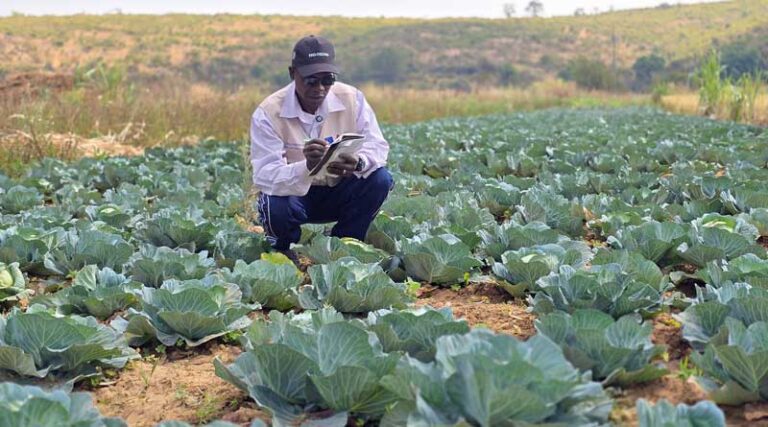
A Garden Of Light
21 October 2025, Africa: Juliana walks along the narrow path that divides her garden into neat squares of thriving crops. She pauses at a cabbage head, lifts it and smiles. Her once-parched fields now flourish thanks to a solar-powered, low-pressure irrigation system that delivers water efficiently to her crops, even during dry spells. These practical tools and accompanying training on using them have made it possible for her to grow food consistently, despite the region’s unpredictable climate.
Just a few years ago, Juliana lost her husband and was struggling to provide for her six children on the meager harvests from her small farm. Like many families from Baixa da Missão (Huila), southern Angola, she faced season after season of failed rains and withered crops. Climate shocks such as El Niño shortened planting windows and reduced yields.
Juliana joined her local Farmer Field School (FFS) – Chitaka to take these matters into her own hands. The Chitaka FFS, a community-based learning group, is supported by the European Union–funded Strengthening Resilience and Food and Nutrition Security in Angola (FRESAN) programme. In partnership with the Agrarian Development Institute and with technical implementation by the Food and Agriculture Organization of the United Nations (FAO), the FRESAN initiative has trained over 7 425 smallholder farmers in more than 30 Farmer Field Schools across the region.
At the core of each FFS is a compact, integrated demonstration plot where farmers work together to test practical solutions throughout the season. They learn which techniques and climate-smart practices work best in their environment. And the FFS tackles many issues at once: combining water-saving irrigation, soil health, crop diversity and livestock care into one manageable space.
Juliana’s group of over 20 farmers installed a solar-powered, micro-pump, provided by the project, that draws groundwater using renewable energy. They paired it with low-pressure drip irrigation to optimize the use of limited water resources. This system delivers water directly to the roots of plants, reducing evaporation and ensuring consistent moisture even during dry periods.
“We used to carry water in buckets, and it was never enough,” Juliana recalls. “Now, with the solar pump and drip lines, we can irrigate even during dry spells. The plants are healthier, and we save time and energy.”
The group additionally adopted the use of organic mulch to keep the soil cool and moist, and planted a mix of quick-growing vegetables, staple crops for household food security and legumes to enrich the soil.
“We use the manure from our cattle and goats,” Juliana explains of her maize and vegetable cultivation. “Through the FFS, I have learned new techniques and seen improvements in my yields.”
With sessions on animal health and safe use of veterinary kits, the project also showed how crop and animal care can complement and support each other for greater resilience.
The FFS approach has strengthened local capacity by training not only smallholder farmers, but also community facilitators and extension workers. This ensures that climate-smart practices and new skills spread beyond the demonstration plot into household fields.
For Juliana and communities in Huila, these changes have translated into more reliable access to fresh vegetables and a steady income to help cover school fees and other family expenses.
“Now, I can support my children’s education. My older children now study at university, and the younger ones help in the field after school,” Juliana notes.
While the benefits of FFS may seem modest at first, they are dependable, ensuring a consistent food supply, a small surplus for local markets and practical skills that benefit the community.
As more individuals join Farmer Field Schools, climate-smart agriculture, practical training and solar-powered irrigation are building stronger and more resilient communities, ready to face the challenges of a changing climate.
Also Read: The Quiet Power of Biostimulants: Missing Link in Regenerative Agriculture
📢 If You’re in Agriculture, Make Sure the Right People Hear Your Story.
From product launches to strategic announcements, Global Agriculture offers unmatched visibility across international agri-business markets. Connect with us at pr@global-agriculture.com to explore editorial and advertising opportunities that reach the right audience, worldwide.






